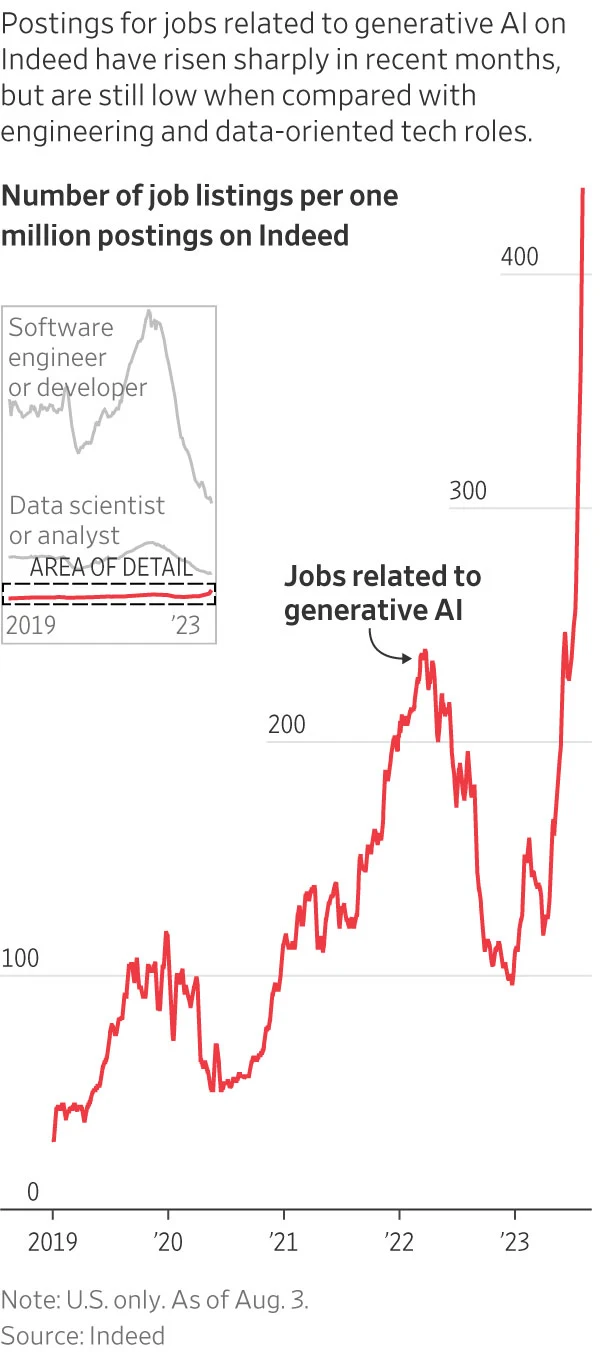Salaries rise as employers such as Netflix and Walmart seek candidates with artificial intelligence skills. The tech giant companies are in ...
 |
| Salaries rise as employers such as Netflix and Walmart seek candidates with artificial intelligence skills. |
The rush to hire is pushing up pay for technical professionals and prompting companies to hone their pitches to applicants to avoid losing out to rivals. Some companies, including Accenture, are building their AI expertise through individual hires and internal training programs. Others, including the technology company ServiceNow, say they are open to acquiring smaller AI startups as a way to scoop up talent.
Compensation is a battleground. Aware that in-demand AI specialists can command several job offers, many companies are dangling salaries in the mid-six figures along with bonuses and stock grants to attract experienced workers, recruiters say. The online-dating platform Hinge, a part of Match Group, is advertising a vice president of artificial intelligence role that comes with a base salary of $332,000 to $398,000 a year.
 |
| Netflix caused a stir when it listed an exceptionally high-paying job for its machine-learning platform/ Bing Guan. |
“We’re trying to hire, but it’s a smoking-hot market,” said Chris Todd, CEO of software company UKG, which is looking to recruit a senior-level leader to oversee its generative AI efforts. The company also plans to retrain existing engineers to work on such products. Recruiters say they see pay edging up because the available supply of AI practitioners is falling short of demand, particularly for midlevel and higher-level positions.
“This is pure market economics,” said Paul J. Groce, a partner and head of the Americas at the executive recruiting firm Leathwaite, where for years he has worked on searches for high-level technology talent. “We do not magically have thousands of additional AI developers, product managers and everything else.”
Salaries for AI roles vary based on the experience required and the company hiring. The total compensation, which typically includes bonuses and stock-based grants, can push overall pay much higher. A product manager position for a machine-learning platform at Netflix lists a total compensation of up to $900,000 annually. The posting for that job gained attention on social media last month amid the strike of Hollywood actors and writers.
Not all positions pay as handsomely. A prompt engineer, an increasingly common role, has an average total compensation of about $130,000 annually, according to Willis Towers Watson, which conducts pay surveys among employers. A machine-learning product engineer job comes with average total compensation of $143,589, according to WTW.
Many of the roles require a degree or advanced experience in computer science, mathematics or data science. Since large language models make judgments based on probability, a strong understanding of statistics is helpful, employers and recruiters say. Senior-level positions may also require prior management experience.
Recruiters and hiring managers say they are watching for candidates in data science or engineering roles to begin inserting “AI” to their existing job titles or professional profiles to better catch the eye of employers. “There’s a certain amount of gamesmanship,” Groce said.
A challenge for many employers is that so many different types of companies want AI talent now. Walmart is hiring for a position on its conversational AI team that includes a base salary of $168,000 to $252,000 annually. Procter & Gamble in Cincinnati is recruiting for an AI engineer with a listed base salary of $110,000 to $132,000 a year. Goldman Sachs is seeking an AI engineer with a base salary of $150,000 to $250,000, plus a bonus, to work on a new generative AI effort at the company, according to a listing.
At the commercial real-estate giant JLL, which is recruiting AI practitioners to work on projects related to the management of commercial buildings, applicants often want to understand the significance of their work. Conversations often go like this: “Look, I’m an AI engineer. I’m obviously a hot commodity. Why should I come to the commercial real-estate [industry] and JLL? What kind of impact am I going to have?” saidMihir Shah, co-CEO of JLL’s technology division. “That’s the No. 1 question.” Shah said he responds that the company has decades of property data that can be used in training sophisticated AI models to help in everything from energy conservation in buildings to determining pricing of commercial properties.
At Accenture, which plans to hire more than a thousand new AI employees in the coming year, many candidates have told the consulting firm that they have several offers. “Everybody’s hiring,” said Lan Guan, the company’s chief AI officer, a newly created title that was announced last month.
Some companies have said they would need to train existing employees to take on AI projects, if only because there are too few midlevel or senior-level employees with the desired skills, said Vinay Menon, a senior client partner at consulting firm Korn Ferry and global lead of its AI practice. “Companies realize that you cannot hire your way out of this,” he said.
Bill McDermott, ServiceNow’s CEO and chairman, said that in the future, the technology company could buy small AI companies that have AI researchers, data scientists and other professionals it needs. ServiceNow acquired Element AI in 2020 and recently bought another AI company, G2K.
“AI talent is hard to get. It’s expensive. And at the same time, it is highly selective,” McDermott said. “People want to go to places where they not only can prosper financially, but they can work on things that inspire them because they have ultimate choice.” —Nate Rattner contributed to this article.

.webp)





